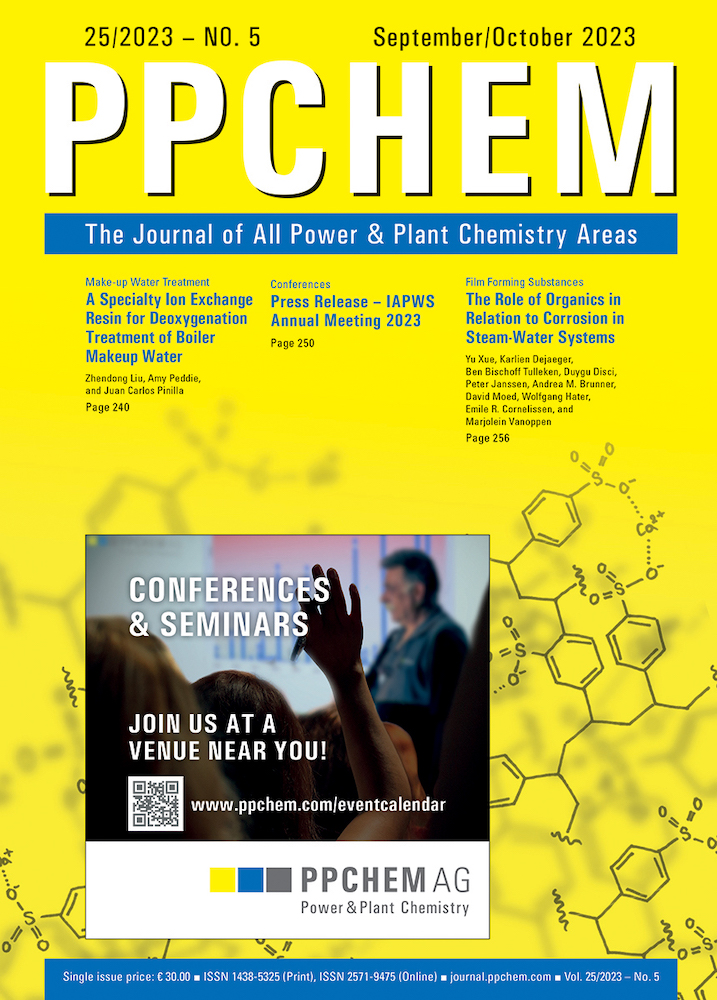
For members only
ABSTRACTS
A Specialty Ion Exchange Resin for Deoxygenation Treatment of
Boiler Makeup Water
Zhendong Liu, Amy Peddie, and Juan Carlos Pinilla
Oxygen level control can be very important in the cycle chemistry of power plants. Sometimes a higher oxygen level is desired for all-ferrous materials due to its creation of the more corrosion-resistant ferric oxide hydrate layer in the natural magnetite. This is practiced as either all-volatile treatment under oxidizing conditions (AVT(O)), or oxygenated treatment (OT). However, for some alloy materials (e.g., copper alloys and nickel alloys) used in the steam generation/recirculation systems, a reducing environment and very low oxygen levels are favored to avoid corrosion. This paper reports on a specialty ion exchange resin and its use in treating the makeup water for a pressurized water reactor (PWR) nuclear power plant. The resin is coated with a precious metal as catalyst for the oxygen-hydrogen reaction to generate water. It requires minimum maintenance (only annual backwashes), and has fast reaction kinetics, a small footprint, and a long operating life (> 20 years). The case study shows the resin can achieve < 10 μg ⋅ L–1 oxygen consistently from a makeup water with 1–10 mg ⋅ L–1 oxygen at a 189–1 514 L ⋅ min–1 flow rate. The catalyst doping, reaction mechanism, and some operational details are discussed.
PPCHEM® 2023, 25(5), 240–244
For Members only
Press Release – IAPWS Annual Meeting 2023
Between September 3rd – 8th, 2023, 62 scientists, engineers and guests representing 20 countries converged in Turin, Italy at the Star Hotel Majestic for the annual meetings of the IAPWS Executive Committee and Working Groups. This continues a series of meetings that began in 1929 in London, UK with the purpose to connect scientists and researchers with the industry operators, engineers and managers who use their work. Collaboration and engagement across these varied groups provides guidance to the researchers on topical problems within industry and provides the engineers with the latest research results for direct application in their facilities.
The main meetings included discussions around power cycle chemistry, high temperature aqueous technologies applicable to steam cycles and hydrogen generation, oceanography and global climate modelling, geothermal steam, electrode boilers, power cycles with CO2 capture and storage systems and combined heat and power systems.
PPCHEM® 2023, 25(5), 250–251
The Role of Organics in Relation to Corrosion in Steam-Water Systems
Yu Xue, Karlien Dejaeger, Ben Bischoff Tulleken, Duygu Disci, Peter Janssen, Andrea M.Brunner, David Moed, Wolfgang Hater, Emile R. Cornelissen, and Marjolein Vanoppen
A sampling campaign was conducted in a film-forming amine product (FFAP) treated highpressure steam-water system of an ammonia producing plant to optimize the cycle chemistry. Cycle chemistry guidelines were assessed to be applicable with modifications fitting the local situation according to the pH and conductivity. Methanol, a main organic compound originating from the production process, entered the steam-water system with the process condensate and was tested possible to degrade. Furthermore, organic compounds from cation exchange resin were found in blowdown streams, suspected to originate from resin carryover. No operational and corrosion issues were observed.
Lab-scale first condensate experiments confirmed that a lower pH was present in the first condensate compared with the bulk steam, however, it was still partially buffered by ammonia. Via corrosion tests it was observed that oleyl propylenediamine (OLDA), in addition to ammonia, formed a smoother and more uniform magnetite layer. Moreover, magnetite layers formed under OLDA added to ammonia were more resistant against acidic conditions (pertinent to condensate return systems) than layers formed under the ammonia only chemistry and blank chemistry (without a chemical additive), with less reduction of the magnetite layer thickness.
These studies in combination with the plant experiences confirm that the steam-water system can be safely run with the selected FFAP treatment concept even with organics from the production process.
PPCHEM® 2023, 25(5), 256–275

